Antinuclear Antibody Test Market Research, 2031
The global antinuclear antibody test market size was valued at $1.3 billion in 2021, and is projected to reach $5 billion by 2031, growing at a CAGR of 15% from 2022 to 2031. Rising prevalence of autoimmune diseases among people, across the globe is expected to drive antinuclear antibody test market in the forecast time period. Antinuclear antibody tests are becoming more and more popular as a way to diagnose autoimmune diseases such rheumatoid arthritis, Systemic Lupus Erythematosus, Sjogren's Syndrome, and many more. These factors are anticipated to propel the antinuclear antibody test market growth in near future.
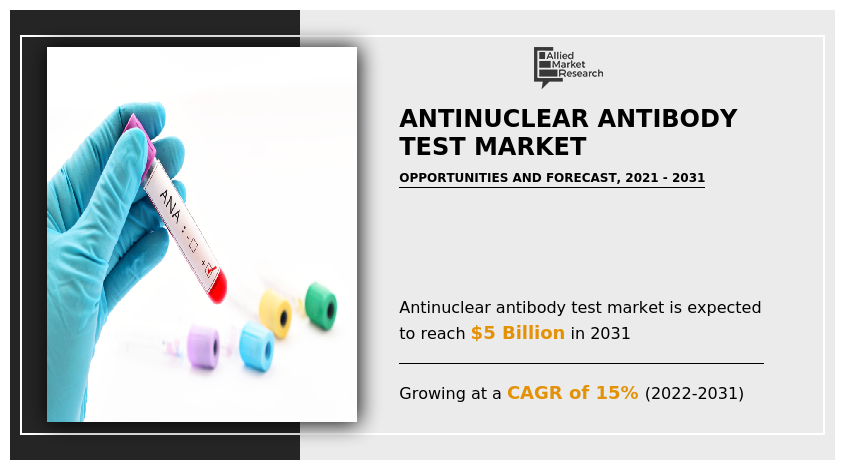
Market Introduction and Definition
Antinuclear antibody (ANA) testing is done to determine whether there are any autoimmune diseases that affect the body's tissues and organs. These exams look for antinuclear antibodies in the blood serum. Human immune system produces antibodies, that fight against foreign invaders like viruses and bacteria. However, an antinuclear antibody targets patient’s own sound cells and causes autoimmune disease. Some most common methods to detect the presence of antinuclear antibodies in the diseased patients are indirect immunofluorescence, and the ELISA. The screening test finds out if the body has these antibodies
The strict U.S. Food and Drugs Administration rules for product approval, lack of experienced laboratory technician, and diagnostic mistakes are the main factors anticipated to impede the growth of the anti-nuclear antibody testing market internationally. Also, despite being a highly sensitive diagnostic tool, the anti-nuclear antibody test lacks specificity, which may limit its commercial growth in the nearby future.
The antinuclear antibody testing market is expanding as a result of technological developments as well as rising R&D expenditures for the creation of fresh products or testing methodologies. Also, the market is expected to accelerate in coming days due to growing government healthcare insurance, an increase in autoimmune disorders awareness campaigns, and reimbursement regulations. Additionally, the service and delivery capacity of the antinuclear antibody test kit is anticipated to increase due to the increased investment in start-ups delivering preventative healthcare tests. The aforementioned factors are projected to increase the antinuclear antibody test market opportunity over the coming years.
The global antibody antinuclear testing market is segmented on the basis of product, technique, application, end use and region. By product, the market is sub-segmented into reagents & assay kits, systems and software & services. By technique, ELISA, immunofluorescence assay and multiplex assay. By application, rheumatoid arthritis, systemic lupus erythematosus, sjogren’s syndrome, scleroderma and others. By end use, hospitals, clinical laboratories, physician office laboratories and others. By region, the market is analyzed across North America, Europe, Asia-Pacific, and LAMEA.
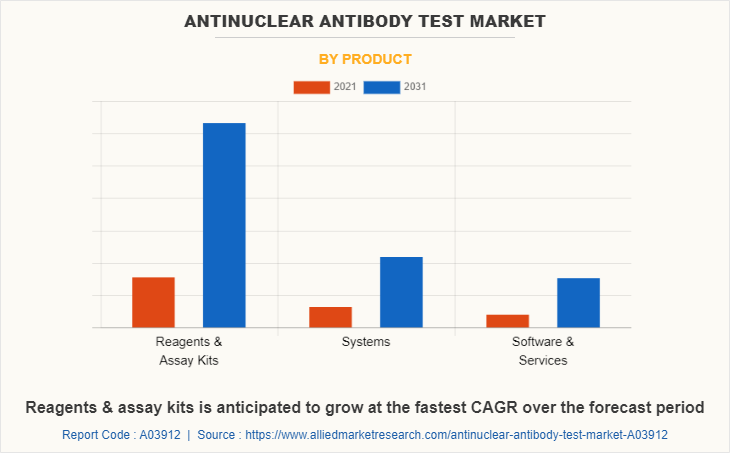
Market Segmentation
By product, the reagents & assay kits sub-segment dominated the market in 2021. The test kits are primarily used in life science research, drug discovery and development, environmental monitoring, and the study of disease pathways, as well as for various research and development purposes such as screening for potential drug candidates and evaluating biopharmaceutical production processes. Such a broad array of applications is anticipated to enhance the market throughout the projected timeframe. These are predicted to be the major factors affecting the antinuclear antibody test market size during the forecast period too.
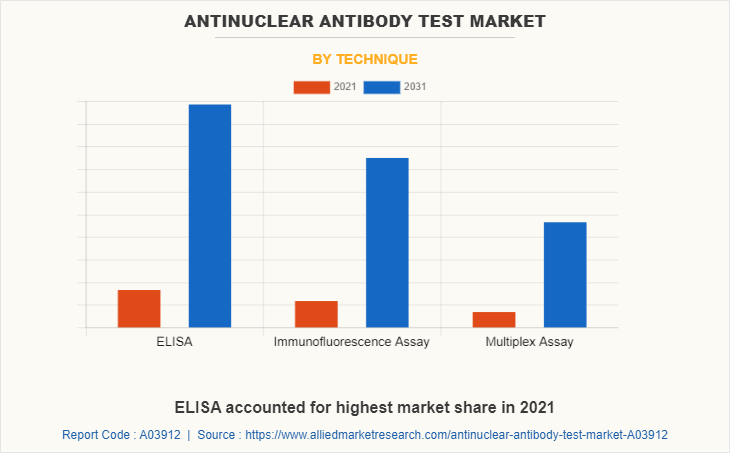
By technique industry, the ELISA sub-segment dominated the global antinuclear antibody test market share in 2021. ELISA or enzyme-linked immunosorbent assay (ELISA) based test is used to find antibodies that the body produces to fight antigens or foreign substances more quickly. Such technique of antinuclear antibody test in the ELISA are bound to create a scope of growth for the sub-segment during the forecast period.
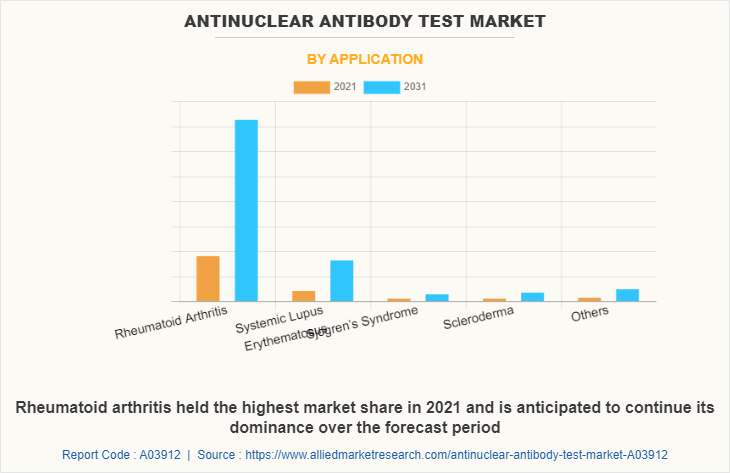
By application, the rheumatoid arthritis sub-segment dominated the global antinuclear antibody test market share in 2021. The primary driving force for the rheumatoid arthritis sub-segment market in the anticipated period is likely to be the increase in the elderly population globally and the incidence of rheumatoid arthritis. Such applications of antinuclear antibody test in the rheumatoid arthritis sector are bound to create a scope of growth for the sub-segment during the forecast period.
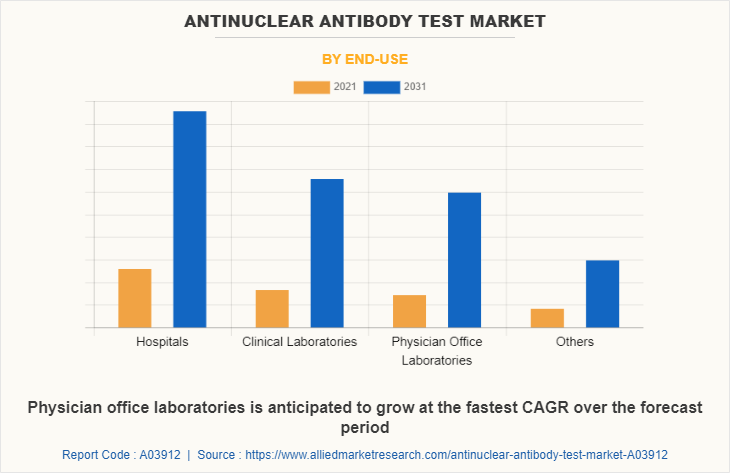
By end-use industry, the hospitals sub-segment dominated the global antinuclear antibody test market share in 2021. The hospital sub segment market is anticipated to be driven by an increase in patient satisfaction, outpatient services, and enhanced home care facilities offered by hospitals throughout the forecast period. Such application of antiulcer antibody test in the automotive sector are bound to create a scope of growth for the sub-segment during the forecast period.
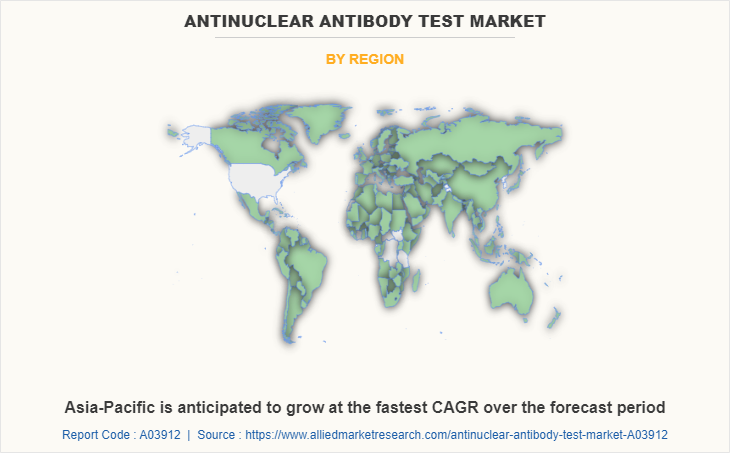
Regional/Country Market Outlook
North America dominated the global market in 2021 and is projected to remain the fastest-growing sub-segment during the forecast period. The market for anti-nuclear antibody tests will expand due in part to the rising prevalence of autoimmune illnesses in the area. Additionally, as the population grows, the likelihood of developing an autoimmune disease also rises, which is expected to improve the region's market throughout the course of the projection period.
Competitive Landscape
The key players profiled in this report include Erba Diagnostics, Bio-Rad Laboratories, Inc., Trinity Biotech Plc., Thermo Fisher Scientific, Antibodies Incorporated, EUROIMMUN Medizinische Labordiagnostika AG, Immuno Concepts NA Ltd., Inova Diagnostics, Inc. and ZEUS Scientific, Inc.
Impact of COVID-19 on the Global Antinuclear Antibody Test Industry
- The antinuclear antibody testing business is anticipated to increase in the Covid-19 pandemic and expand quickly while the disease widespread. The increase in demand for antinuclear antibody tests is the driving factor of this market growth. These tests show that autoimmune illnesses exist in a person's body, making their detection vital.
- The global increase of Covid-19 instances, the rising frequency of chronic diseases, and the rising elderly population are the key causes of the antibody testing market's expansion.
- For instance, a study conducted by the Department of Laboratory Medicine and Pathology at the University of Washington in the United States in 2020 found that 30% of COVID-19 patients had anti-nuclear antibodies that could be detected by conducting the test and henceforth, proper treatment can be suggested to the patients
Key Benefits for Stakeholders
- This report provides a quantitative analysis of the market segments, current trends, estimations, and dynamics of the antinuclear antibody test market analysis from 2021 to 2031 to identify the prevailing antinuclear antibody test market opportunities.
- The market research is offered along with information related to antinuclear antibody test market forecast, key drivers, restraints, and opportunities.
- Porter's five forces analysis highlights the potency of buyers and suppliers to enable stakeholders make profit-oriented business decisions and strengthen their supplier-buyer network.
- In-depth analysis of the antinuclear antibody test market segmentation assists to determine the prevailing market opportunities.
- Major countries in each region are mapped according to their revenue contribution to the global market.
- Market player positioning facilitates benchmarking and provides a clear understanding of the present position of the market players.
- The report includes the analysis of the regional as well as global antinuclear antibody test market trends, key players, market segments, application areas, and market growth strategies.
Antinuclear Antibody Test Market Report Highlights
| Aspects | Details |
| By Product |
|
| By Technique |
|
| By Application |
|
| By End-use |
|
| By Region |
|
| Key Market Players | ZEUS Scientific, Inc., Trinity Biotech Plc., euroimmun medizinische labordiagnostika ag, Immuno Concepts NA Ltd., erba diagnostics mannheim gmbh, Thermo Fisher Scientific, Inc., Inova Diagnostics, Inc., Bio-Rad Laboratories, Inc., Antibodies Incorporated |
Analyst Review
Increasing demand for antinuclear antibody test to detect presence of autoimmune disease in patients is the key factor that is projected to drive the growth of the global antiulcer antibody test market during the forecast period. Several government organizations are putting into action a number of initiatives to promote health insurance plans to give families financial security, which is anticipated to spur market expansion in the upcoming years.
However, government rules and regulation for approval of various medical equipment is predicted to be a major restraint for the antinuclear antibody testing market growth during the forecast period. Furthermore, it is predicted that the antinuclear antibody market will have plenty of development prospects over the forecast period due to rising investments in the advancements of medical laboratories, particularly in emerging nations where spending in healthcare infrastructure and test kits are expanding.
Among the analyzed regions, North America is expected to account for the highest revenue in the market by the end of 2030, followed by Asia-Pacific, Europe, and LAMEA. Increasing cases of autoimmune diseases across the region are the key factors responsible for leading position of North America and Asia-Pacific in the global antinuclear antibody test market.
The diverse use of antinuclear antibody test, worldwide, to identify the occurrence of autoimmune diseases like rheumatoid arthritis, systemic lupus erythematosus, sjogren’s syndrome, scleroderma and other sectors is the major market driver. In addition, increasing investments for the establishment of medical laboratories especially in the developing countries, due to rising investments for healthcare infrastructure and test kits, is estimated to generate ample growth opportunities for the antinuclear antibody market in the estimated timeframe.
Rising investment in developing test kits is predicted to create more growth opportunity for the market is anticipated to boost the antinuclear antibody test market in the upcoming years.
Asia-Pacific will provide more business opportunities for the global antinuclear antibody test market in future.
Hospitals sub-segment of the end-use industry acquired the maximum share of the global antinuclear antibody test market in 2021.
Erba Diagnostics, Bio-Rad Laboratories, Inc., Trinity Biotech Plc., Thermo Fisher Scientific, Antibodies Incorporated, EUROIMMUN Medizinische Labordiagnostika AG, Immuno Concepts NA Ltd., Inova Diagnostics, Inc. and ZEUS Scientific, Inc. and the major players in the antinuclear antibody test market.
The major growth strategies adopted by antinuclear antibody test market players are investment and agreement.
Hospitals and Physician Office Laboratories are the major customers in the global antinuclear antibody test market.
The report provides an extensive qualitative and quantitative analysis of the current trends and future estimations of the global antinuclear antibody test market from 2021 to 2031 to determine the prevailing opportunities.
Loading Table Of Content...



